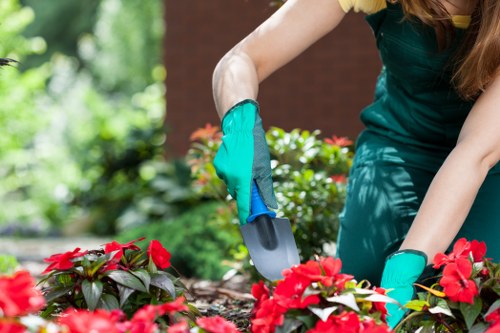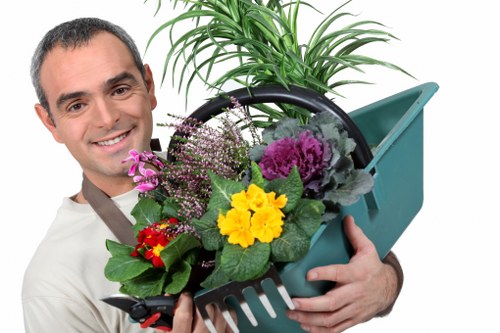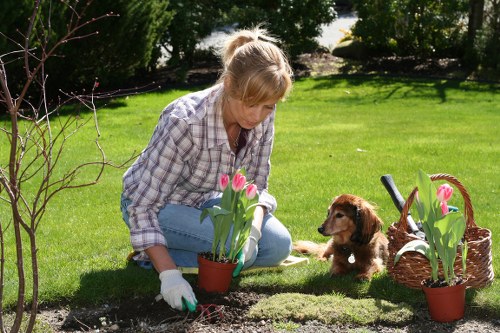Comprehensive Guide to Garden Maintenance in Hornsey

Maintaining a beautiful garden in Hornsey requires a blend of passion, knowledge, and the right strategies. Whether you're a seasoned gardener or a novice, understanding the unique climate and soil conditions of Hornsey can make all the difference in achieving a thriving outdoor space.
Hornsey, located in North London, benefits from a temperate climate that supports a wide variety of plants. However, the urban setting presents its own set of challenges, including limited space and exposure to pollution. Effective garden maintenance in this area involves tailored approaches to address these specific conditions.
In this article, we will explore essential garden maintenance tips, seasonal tasks, and professional services available in Hornsey to help you create and sustain a vibrant garden all year round.
Understanding Hornsey’s Climate and Soil

The first step in successful garden maintenance is understanding the local climate and soil type. Hornsey experiences mild winters and warm summers, with rainfall distributed throughout the year. This climate is ideal for a diverse range of plants, from perennials to annuals.
The soil in Hornsey varies but is generally a mix of clay and loam, providing good drainage while retaining essential nutrients. However, urban soils can be compacted and may require amendments to improve fertility and structure.
Regular soil testing and the addition of organic matter, such as compost or well-rotted manure, can enhance soil health, promoting robust plant growth and resilience against pests and diseases.
Essential Garden Maintenance Tasks

1. Regular Weeding
Weeds compete with your garden plants for nutrients, water, and light. Regular weeding ensures that your desired plants receive the resources they need to flourish.
2. Pruning and Trimming
Pruning helps maintain the shape and health of your plants. It encourages new growth, removes dead or diseased branches, and improves air circulation.
3. Watering Practices
Consistent watering is crucial, especially during the hot summer months. Drip irrigation systems can provide efficient water distribution, reducing waste and ensuring that plants receive the right amount of moisture.
Advanced Watering Techniques
Consider implementing rainwater harvesting systems or using mulch to retain soil moisture, further enhancing your garden’s sustainability.
Seasonal Garden Maintenance

Spring Maintenance
Spring is the perfect time to prepare your garden for the growing season. Start by clearing out any debris from the winter months and testing your soil’s pH levels.
Summer Care
During the summer, focus on watering, weeding, and protecting your plants from pests. Mulching can help retain moisture and suppress weed growth.
Autumn Preparation
As temperatures drop, it’s essential to prepare your garden for winter. This includes planting bulbs for spring, harvesting late-season vegetables, and protecting sensitive plants from frost.
Winter Maintenance
Even in winter, some maintenance is necessary. Prune dormant plants, clean garden tools, and plan your garden layout for the upcoming year.
Choosing the Right Plants for Hornsey Gardens

Selecting plants that thrive in Hornsey’s climate is vital for a low-maintenance garden. Opt for native species and those adapted to urban environments to ensure resilience and longevity.
- Perennials: Plants like lavender, echinacea, and hostas are excellent choices for their hardiness and minimal upkeep.
- Annuals: For vibrant seasonal color, consider petunias, marigolds, and impatiens.
- Shrubs and Trees: Dwarf varieties of roses, hydrangeas, and ornamental trees can add structure and beauty without overwhelming your space.
Incorporating a mix of foliage, flowers, and structural plants can create a dynamic and visually appealing garden.
Professional Garden Maintenance Services in Hornsey
While DIY garden maintenance can be rewarding, professional services offer expertise and efficiency that can elevate your garden’s appearance and health.
Experienced garden maintenance companies in Hornsey provide a range of services, including lawn care, planting, pruning, pest control, and landscape design. They utilize advanced tools and sustainable practices to ensure your garden remains pristine and eco-friendly.
Hiring professionals can save you time and effort, allowing you to enjoy your garden without the stress of upkeep.
Eco-Friendly Garden Maintenance Practices
Adopting sustainable practices in garden maintenance not only benefits the environment but also promotes a healthier garden. Here are some eco-friendly tips:
- Composting: Recycle garden waste and kitchen scraps to create nutrient-rich compost for your plants.
- Rainwater Harvesting: Use collected rainwater for irrigation to reduce reliance on tap water.
- Native Plants: Choose plants native to Hornsey to support local wildlife and reduce maintenance needs.
- Organic Pest Control: Utilize natural predators and organic treatments to manage pests without harmful chemicals.
Benefits of Eco-Friendly Gardening
Implementing these practices can lead to a more resilient garden, improved soil health, and a positive impact on local biodiversity.
Common Garden Problems in Hornsey and Solutions
Pest Infestations
Pests like aphids, slugs, and mites can damage your plants. Regular monitoring and the use of organic pesticides can help control these issues.
Disease Management
Fungal diseases, caused by poor air circulation or overwatering, can be mitigated through proper pruning and drainage management.
Weed Control
Persistent weeds require consistent removal and the use of mulch to prevent their growth.
Integrated Pest Management (IPM)
Adopting IPM strategies involves using a combination of biological, cultural, and mechanical methods to manage garden pests effectively.
Tools and Equipment for Effective Garden Maintenance
Having the right tools is essential for efficient garden maintenance. Invest in quality equipment to make tasks easier and more enjoyable.
- Pruning Shears: For trimming and shaping plants.
- Garden Fork: Useful for aerating soil and digging.
- Watering Can or Hose: Ensures your plants receive adequate moisture.
- Wheelbarrow: Helps in transporting soil, compost, and plants.
- Rake: Essential for clearing debris and leveling soil.
Regular maintenance and cleaning of your tools will extend their lifespan and ensure they function effectively.
Designing a Sustainable Garden in Hornsey
A sustainable garden not only looks beautiful but also supports the environment. Here are some design tips:
- Plant Diversity: Incorporate a variety of plants to promote biodiversity and reduce pest problems.
- Water Efficiency: Design your garden layout to maximize water efficiency, using drip irrigation and rain barrels.
- Energy Conservation: Utilize solar-powered garden lights and tools to reduce energy consumption.
- Recycling Materials: Use recycled or sustainable materials for garden structures and pathways.
Creating Habitats for Wildlife
Include features like birdhouses, bee hotels, and native plants to attract and support local wildlife, enhancing the ecological value of your garden.
Maintaining Your Garden Throughout the Year
Consistent year-round maintenance ensures your garden remains healthy and attractive. Here's a monthly maintenance checklist:
- January: Plan your garden layout and order seeds.
- February: Start seed sowing indoors and prune dormant trees.
- March: Begin planting early spring vegetables and perennials.
- April: Continue planting and start regular watering routines.
- May: Mulch beds and monitor for pests.
- June: Maintain consistent watering and fertilize plants.
- July: Harvest early crops and manage weeds.
- August: Prepare for autumn planting and water efficiently.
- September: Plant bulbs for spring and start clearing dead plants.
- October: Leaf cleanup and protect plants from frost.
- November: Finalize garden maintenance and store tools.
- December: Reflect on the year's garden progress and plan for next season.
By following a structured maintenance schedule, you can ensure your garden remains in top condition throughout the year.
Benefits of Regular Garden Maintenance
Consistent garden maintenance offers numerous benefits, including:
- Enhanced Aesthetic Appeal: A well-maintained garden is visually pleasing and can increase property value.
- Healthier Plants: Regular care ensures your plants are robust and resistant to diseases.
- Environmental Impact: A healthy garden supports local biodiversity and contributes to a greener environment.
- Personal Well-being: Gardening can be a therapeutic and rewarding activity, promoting mental and physical health.
Investing time and effort into garden maintenance pays off with a thriving, beautiful outdoor space that you can enjoy year after year.
Conclusion: Achieving a Thriving Garden in Hornsey
Garden maintenance in Hornsey requires a blend of knowledge, dedication, and the right tools. By understanding the local climate, choosing appropriate plants, and adhering to regular maintenance routines, you can cultivate a garden that not only looks stunning but also supports a healthy ecosystem.
Whether you decide to undertake the maintenance yourself or enlist the help of professional services, the key is consistency and care. Embrace sustainable practices to ensure your garden remains vibrant and resilient for years to come.
Contact us today to learn more about our garden maintenance services in Hornsey and take the first step towards achieving your dream garden.